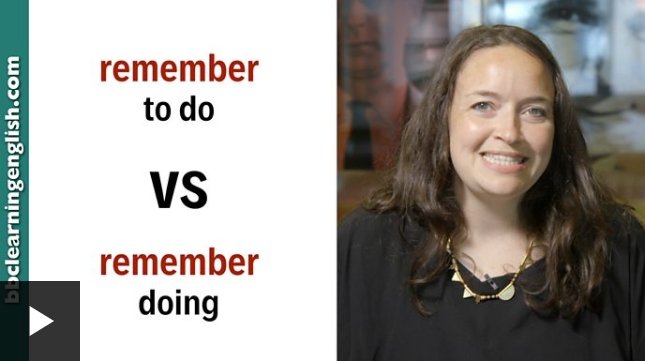Do you have a minute to spare to learn some English? Sam’s telling us the difference between remember to do and remember doing. Let’s hope we remember! Give us 60 seconds and we’ll give you the English!
Sam
Welcome, everyone! Sam from BBC Learning English here.
You probably already know that in English we have some verbs that are always followed by the infinitive – for example: want. And other verbs that are always followed by the gerund – for example: enjoy.
But we also have some verbs in English that can be followed by either the infinitive or the gerund and the meaning will change, for example: remember
Remember to bring your umbrella – where first you remember and then you bring your umbrella. This is commonly used when talking about the future.
I remember meeting my best friend when I was little – where first I met my best friend and then I remembered it. This is now a memory, so it’s commonly used when talking about the past.
Remember to do vs remember doing
Verb patterns
In English, when two verbs are used together the first verb tells the second verb what form to take. Some verbs are always followed by an infinitive verb, others are followed by a gerund – an ING verb. In some cases a verb can use either an infinitive or gerund and the choice can make a difference in meaning.
- I want to go to the cinema.
- I enjoy going to the cinema.
- I stopped to go to the cinema.
- I stopped going to the cinema.
Remember
Remember can be followed by an infinitive or a gerund and there is a difference in meaning.
- I need to remember to go shopping.
- I remember going shopping this morning.
Infinitive
When we follow remember with an infinitive, we remember first and then do the action second. This is commonly used to talk about the future – especially when we need to remember to do something later – such as shopping!
- Remember to bring your umbrella.
- She needs to remember to finish her homework before 4pm.
- I must remember to go shopping later – we have no food!
Gerund
When we follow remember with a gerund, we do the action first and then later remember it. The action is a memory and this form is commonly used to talk about the past.
- I remember meeting my best friend when I was little
- Can you remember going fishing with Dad when we were six?
- Before she left she told me that she remembered baking cakes with you. It is her favourite memory.
